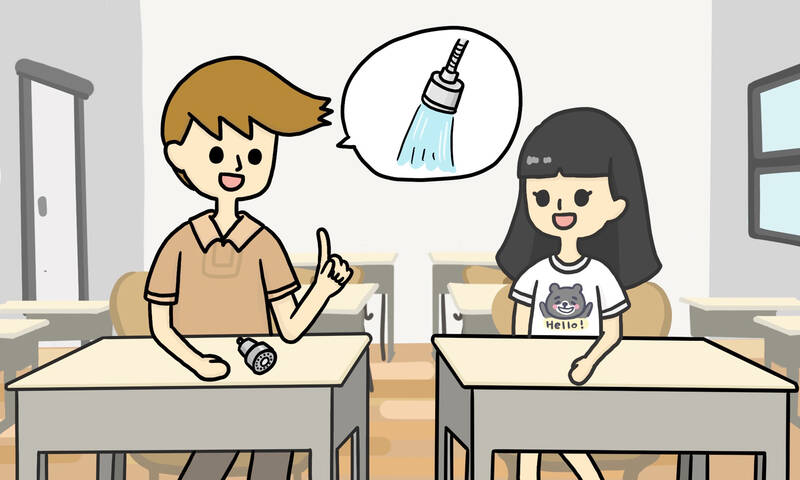對話 Dialogue
小實:馬克,你桌上那個是省水的「起泡器」嗎?
Xiǎoshí: Mǎkè, nǐ zhuō shàng nàge shì shěngshuǐ de “qǐpàoqì” ma?

馬克:嗯,這是我要回家裝在水龍頭上的。
Mǎkè: En, zhè shì wǒ yào huíjiā zhuāng zài shuǐlóngtóu shàng de.
小實:哇!我也想買這個,可是不知道有沒有效。
Xiǎoshí: Wa! Wǒ yě xiǎng mǎi zhège, kěshì bù zhīdào yǒu méiyǒuxiào.
馬克:我也是第一次買這個,希望可以省一點水。
Mǎkè: Wǒ yěshì dì yī cì mǎi zhège, xīwàng kěyǐ shěng yìdiǎn shuǐ.
小實:好,我也趕快去買一個來裝,一起珍惜水資源。
Xiǎoshí: Hǎo, wǒ yě gǎnkuài qù mǎi yíge lái zhuāng, yìqǐ zhēnxí shuǐzīyuán.
馬克:其實省水還有很多方法,像是多淋浴、不泡澡。
Mǎkè: Qíshí shěngshuǐ háiyǒu hěnduō fāngfǎ, xiàngshì duō línyù, búpàozǎo.
小實:我們家沒有浴缸,所以我只能淋浴。
Xiǎoshí: Wǒmen jiā méiyǒu yùgāng, suǒyǐ wǒ zhǐ néng línyù.
馬克:還有重複用水,像是我用除濕機的水來沖馬桶。
Mǎkè: Háiyǒu chóngfù yòngshuǐ, xiàngshì wǒ yòng chúshījī de shuǐlái chōng mǎtǒng.
小實:哇!你真的很珍惜水資源,我要向你看齊。
Xiǎoshí: Wa! Nǐ zhēnde hěn zhēnxí shuǐ zīyuán, wǒ yào xiàng nǐ kànqí.
翻譯 Translation
Xiaoshi: Mark, is that a water-saving “bubbler” on your desk?
Mark: Yes, I’m going to put it on the faucet once I get home.
Xiaoshi: Wow! I want to buy this too, but I don’t know if it will work.
Mark: I’m also using this for the first time, hoping to save water.
Xiaoshi: Well, I should buy one as soon as possible so we can cherish water resources together.
Mark: In fact, there are many ways to save water, such as taking showers more, instead of taking baths.
Xiaoshi: We don’t have a bathtub at home, so I can only take a shower.
Mark: Also, I use the water from the dehumidifier to flush the toilet.
Xiaoshi: Wow! You really do cherish water resources. I’m impressed.
單字片語 Vocabulary
1. 省(水)shěng (shuǐ) to save (water)
2. 起泡器 qǐpàoqì bubbler
3. 水龍頭 shuǐlóngtóu faucet
4. 珍惜 zhēnxí to cherish
5. 水資源 shuǐ zīyuán water resources
6. 淋浴 línyù take a shower
7. 泡澡 pàozǎo take a bath
8. 浴缸 yùgāng bathtub
9. 重複 chóngfù re-, repeatedly
10. 沖馬桶 chōng mǎtǒng to flush the toilet
教材音檔 Audio Files
教材影片 Video Files:
https://www.instagram.com/celc.nou_tw/guide/_/17999106352646292/
實踐大學華語中心提供
By Shih Chien University Chinese Language Center: https://chineseusc.com/

The Dutch introduced the Indian mango (Mangifera indica) to Taiwan in the 17th century. It is a green-skinned mango with thick fibers that get stuck in the teeth, but it boasts a rich aroma and a unique taste. In 1954, Taiwan’s Council of Agriculture introduced several mango cultivars from Florida, USA, including the Irwin, Haden, and Keitt varieties. After seven years of testing and domestication, the Irwin variety was chosen for promotion. Years later, the sample saplings started to bear fruit. These mangoes were large, with thin, vibrant red peels and golden pulp. The Irwin mangoes were mouth-wateringly sweet and

As the priest Antonius Hambroek stood in the dim chamber of Fort Zeelandia, his eldest daughter clung to him, her voice trembling. “Father, don’t go. They’ll kill you, and what will become of Mother and my sisters?” Outside, the sounds of Koxinga’s relentless canon siege boomed through the fortress. The defenders were on the brink of collapse. Starvation gnawed at their resolve, and the air carried the acrid stench of spent gunpowder and rotting flesh. Dutch reinforcements from Batavia had failed to arrive, leaving the garrison isolated and hopeless. Hambroek’s face was calm, though sorrow weighed heavily on his

對話 Dialogue 清清:今天中午我要多吃一點,不然晚上可能會吃不飽。 Qīngqing: Jīntiān zhōngwǔ wǒ yào duō chī yìdiǎn, bùrán wǎnshàng kěnéng huì chībùbǎo. 華華:怎麼了?為什麼會吃不飽? Huáhua: Zěnmele? Wèishénme huì chībùbǎo? 清清:今天大年初七,是「人日節」,傳統上結了婚的女兒要回家給父母送長壽麵,而且最好是素的,我姐姐會回來,只吃素麵,我應該很快就餓了。 Qīngqing: Jīntiān Dànián chūqī, shì “Rénrì jié,” chuántǒng shàng jiéle hūn de nǚ’ér yào huíjiā gěi fùmǔ sòng chángshòumiàn, érqiě zuìhǎo shì sù de, wǒ jiějie huì huílái, zhǐ chī sùmiàn, wǒ yīnggāi hěn kuài jiù èle. 華華:我還是第一次聽說有「人日節」呢!這是怎麼來的啊? Huáhua: Wǒ háishì dì yī cì tīngshuō yǒu “Rénrì jié” ne! Zhè shì zěnme lái de a? 清清:老一輩的人說,女媧是在第七天造出了「人」,所以今天可說是我們每個人的「生日」呢!生日快樂! Qīngqing: Lǎoyíbèi de rén shuō, Nǚwā shì zài dì qī tiān zào chūle “rén,” suǒyǐ jīntiān kěshuōshì wǒmen měi ge rén de “shēngrì” ne! Shēngrì kuàilè! 華華:你也是啊!欸?那前六天女媧都做了什麼呢? Huáhua: Nǐ yěshì a! Éi? Nà

As we bundle up in thick coats to stay warm during the winter, there is a population that has already adapted to extremely low temperatures. These people live in the remote city of Yakutsk, the coldest city on Earth. Yakutsk is situated in the heart of Siberia, which is the capital of the Sakha Republic in Russia. This historic mining city began to flourish in the 19th century following the discovery of gold deposits. Given its construction on permafrost, the average temperature in the city remains below 0°C for over half the year, with winter temperatures dropping to an astonishing -50°C.